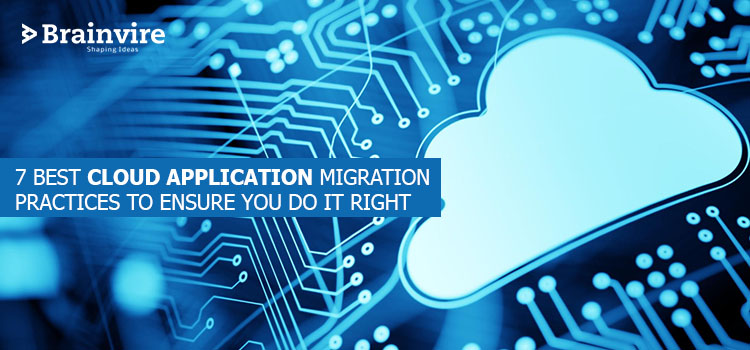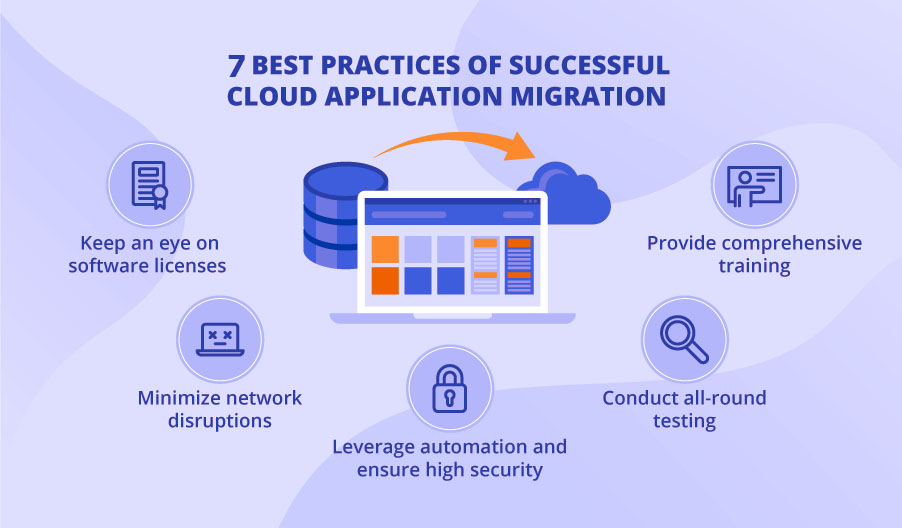
There are still several businesses in the market that aren’t sure about migrating their apps to the cloud regardless of the various benefits it has to offer. This is because carrying out a flawless and seamless migration process is an overwhelming task!
Statistics suggest that nearly 42% of organizations endure cloud migration failure, which ultimately results in data breaches, app downtime, and other technical issues. However, in this blog, we have put together a list of 7 best practices that can help you conduct a smooth cloud migration while preventing various problems.

Here is what we’ll be covering:
- Create a Cloud Migration Strategy
- Keep Tabs on the Software License
- Reduce Network Disruption
- Adopt Automation & Ensure Top-Class Security
- Carry Out Thorough Testing
- Offer Comprehensive Staff Training
- Keep an Eye on the Cloud Usage
Before that let’s take a look at some of the benefits and challenges of cloud migration.
Benefits of Cloud Migration
Some of the vital advantages of cloud deployment include:
- Improved Productivity and Security
- Application Scalability
- Lowered Maintenance Expenses
- Increased Flexibility
Challenges of Conducting Cloud Migration
Regardless of the above-mentioned cloud migration benefits, there are two crucial challenges that you need to keep in mind before making the decision.
1. Unnecessary Cloud Expenses
When it comes to leveraging the cloud, you need to first get an understanding of its cost reduction feature. This is because several studies suggest that many cloud users have experienced up to 35% of unnecessary cloud expenses.
This means your cloud migration could be only as budget-friendly as you try to make it.
2. Lack of Skills
The lack of skills is yet another challenge that you need to overcome!
It’s important for you to tackle this one, if you want to ensure that your company has a team with the potential to secure the cloud environment while making sure the migration process is conducted seamlessly.
But it won’t be enough to simply have a team that has complete knowledge of IT security. This is because cloud security needs an understanding of other platforms and its nuances like Azure Development, its app management, and other integrations.
Best Cloud Application Migration Practices
Create a Cloud Migration Strategy
One of the best practices that you cannot overlook while conducting the migration process is creating a comprehensive cloud migration strategy. This helps discover your business objectives and leverage various cases for a smooth transition to the cloud.
Perhaps a great tactic could be to migrate in smaller stages. Or else, you can also carry out a pilot migration wherein you begin with migrating the ‘not-so-important’ mission-critical operations. That way, you gain the confidence and experience to shift larger workloads.
Another strategy could be to use the 5 Rs of Gartner:
- Rehost on IaaS (Infrastructure as a Services)
- Refactor for PaaS (Platform as a Service)
- Revise for PaaS or IaaS
- Rebuild on Platform as a Service
- Or Replace with SaaS (Software as a Service)
Keep Tabs on the Software License
We would suggest you to go through your applications’ licensing rules before migrating them to the cloud. This helps you get a clear understanding of whether the current license is suitable for the cloud infrastructure or does it require renegotiation or upgradation.
You might have a possibility of changing the software licensing model in order to optimize the cloud maintenance expenses, as license management on the cloud could be a little intricate.
Reduce Network Disruption
The process of cloud or Azure migration ends up increasing the load on the system’s network since a massive volume of information has to be moved. Due to this, you’re likely to endure network disruption and downtime.
In order to prevent these issues, we’d recommend you to select a cloud service provider who can deliver various methods to migrate to the cloud environment without overburdening the network. Among the best cloud service providers, Azure offers a customized service that can easily connect to your business’ network whereas AWS provides a dedicated connection to the cloud infrastructure.
Adopt Automation & Ensure Top-Class Security
The adoption of automation can help you accelerate your migration process while lowering its overall time. It also helps you ensure complete safety and consistency, and prevents any service disruption. So we’d suggest you automate all your business processes, app delivery for instance, during cloud migration.
In order to prevent data loss and breach while migrating to the cloud, implement various multilevel security measures and offer data backups at all times!
Carry Out Thorough Testing
Cloud application migration isn’t a simple data export process. It is essentially a process that can cause bugs to appear in your migrated apps. Also, it’s important to check your applications’ quality before migrating them since that ensures the old bugs from re-emerging.
We’d suggest you carry out an extensive pre and post-migration testing, as that helps check the app’s reliability, security, and functionality.
Offer Comprehensive Staff Training
The success of your cloud app migration heavily relies on user adoption. So we recommend that you organize a set of staff training sessions, as that teaches your employees how to effectively leverage the updated app and improve their performance.
Keep an Eye on the Cloud Usage
From the very beginning, you need to keep tabs on your cloud usage especially if you don’t want your business to be among those experiencing up to 35% of unnecessary cloud expenses.
To help you out, you can create a centralized console which can help you discover the ongoing instances across various cloud services.
It is also important to monitor the security and compliance of your cloud environment along with gathering logs from your databases, network touchpoints, systems, and applications. This ensures that all the data security requirements are met.
Seek Assistance from a Professional for Cloud Migration
The success or failure of your cloud application migration process largely relies on the expertise and experience of those conducting the migration.
If you aren’t sure that your in-house team has the required skills and knowledge to carry out a reliable and smooth migration, then it’s best to get in touch with a professional who can help you out.
The Bottom Line
It’s getting increasingly evident that if you want to gain a competitive edge over others, you need to migrate some of your business operations to the cloud.
Carrying out an efficient and seamless cloud migration process is certainly no mean feat. However, by taking the above-mentioned practices in stride, your business can absolutely improve the possibility of doing it the right way!
Related Articles
-
Brainvire’s Consultative Cloud Assessment Services
When a business says it is migrating to the cloud, it means it is moving data, applications, and other aspects of digital operations to a cloud-based infrastructure. In most cases,
-
Be prepared for what’s next: Accelerate cloud migration
The Present Scenario The present time is uncertain. There is hardly any knowledge about the various types of implications due to the health crisis, economic instability, and governance policy. In
-
Has Cloud Migration become a Mandate for Growing Your Business?
COVID-19 has affected businesses drastically. Businesses that were quick to adapt to digital transformation have stayed afloat. Some have even surpassed their pre-pandemic profit. Cloud adoption has become a necessity



